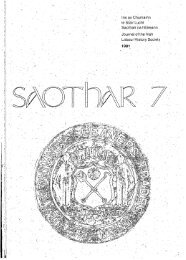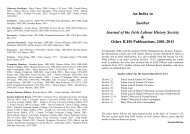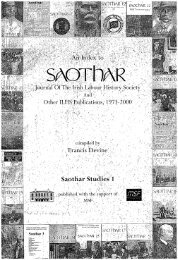60tions of recruitment to the IRA and how it operated inBelfast during the 1930s would not be available fromcontemporary written sources.The oral data, which include three life historiesdescribing a shipyard worker's life, a republican's life,and a young worker's gradual conversion to socialism,are so fascinating that it seems almost petty to questionthe method by which they were collected. However, inthe last short chapter of the book, the authors deal withsome deeper problems raised by oral history. Someright wing phenomenologists in the social scienceshave dismissed the possibility of historical data beingextracted from an oral account. The account maycontain such data, they argue, but it can only be understoodas part of a communication between teller andlistener, which expresses their ongoing social relationship.Munck and Rolston would agree that the oralaccount is part of a living social relationship betweenteller and listener, but they also stress the relationshipbetween past and present. They see these connectionsas a strength rather than a weakness of the method, andpresumably expect their book to operate in the sameway. It is about the past, but it is given its meaning bythe present, and itmay have relevance for planning thefuture. The problems of oral history are in the end theproblems of any attempt at human understanding. Weare all in it up to the neck. We cannot detach ourselvesfrom life, or even bracket parts of it off except as a verytemporary stage in analysis.This is a very stimulating book. Many readers willbe arguing with it even while reading it. They shouldcertainly be arguing after they have finished it. Whetheror not the authors have achieved one of their centralaims, to debunk the 'myth' that 1932 was a transcendentmoment for the Belfast working class is problematic.They are certainly convincing when they arguethat most participants in the ODR strike did not seethemselves as part of a pre-revolutionary, anti-imperialiststruggle, and that sectarianism was only partiallyin abeyance even during the strike. However, to paraphraseE.P. Thompson, to say that something is a mythis not to say that it is all false. 1932 should remain asan inspiration. The events were remarkable, and thepreviously unsung heroes, who are now on recordthanks to this fine book, set us all an example by theirgenerosity of spirit, and sheer courage.Jonathan BellJim Cooke, Technical Education and the Foundationof the Dublin United Trades Council, 1886-1986. (feachers' Union of Ireland, Dublin, 1987), pp.64, no priceJohn Cunningham, with introduction by Michael D.Higgins, Mayday! Galway and the Origins ofInternationalLabour Day, (Galway West ConstituencySAOTHAR 13Council of the Labour Party, Galway, 1987), pp. 12, nopriceMichael Enright, Men of Iron: Wexford FoundryDisputes, 1890-1911. (Wexford Council of TradeUnions, Wexford, 19~7), pp. 68, illustrated, £2.00It is good that the current upsurge of interest in localhistory is not without its fair share of studies in labourand trade union affairs. Indeed, the investigation of thelabour movement at local level affords a tremendousscope to the aspiring historian, not merely because solittle has as yet been done, but also because the subjectitself is so diverse, a point well illustrated by the threepamphlets under review.John Cunningham takes Mayday! Galway and theorigins of International Labour Day as his theme andshows how an event with its origins in the evolution ofthe American trade union movement assumed an internationaldimension as labour's struggles became morepoliticised; especially in the aftermath of the BolshevikRevolution, when Red Flags came to plague the peaceof-mindof Galway's employers in 1919. He tells hisstory briefly but well, and one has but to close one'seyes to visualise milling workers outside the town hallat GoTt, lustily singing the 'Red Flag', to get a rareglimpse of what is the very guts of labour's story.Technical Education and the Foundation of theDublin United Trades' Council, 1886-1986, by JimCooke of the Teachers' Union of Ireland, undertakesthe far more ambitious task of portraying the contributionsof trade unionism to the establishment of technicaleducation. In a work of some 60 odd pages he givesan outline of the Capital's trade union heritage, evolvingfrom the medieval guild system, surviving thecombination laws of the 18th century, and anti-tradeunion laws of the 19th century, to the founding of theUnited Dublin Trades Council in 1886. Along the waythe author outlines the haphazard fashion in which theinstitutionalisation of technical education evolved inthe city, from its origins in the Mechanics' Institutemovement of 1825, to the establishment of a municipaltechnical school at Kevin Street in 1887, the first of itskind in the country. A study such as this invariablyprovides a bountiful supply of new and interestinginformation. I wonder how many today appreciate theimportance of the role played by the trade unions in thefounding of Kevin Street technical school. I certainlydidn't when, years ago, I trudged through its doors atnight to fulfil my apprenticeship obligations.The Pierce foundry in Wexford town was a longways from Kevin Street in more ways than one, and thisis well depicted by Michael Enright, whose bookletMen of Iron I enjoyed immensely. It is a wellresearchedand tightly written story of strife, of defeatsand of victory, as Wexford's iron workers came to gripswith the bread and butter aspects of industrial relations.The centre piece of the pamphlet is the lockout of 1911,
REVIEWSresulting from the arrival of the rrGWU on the localscene. The story of the ensuing conflict is front-linestuff: provocation, confrontation, rallies, importedblacklegs, baton-charges, arrests, yes, even a fatality inthe person of Michael Leary, who died from a blow ofa peeler's baton. The lockout dragged on from Agusut1911 to February 1912, first under the leadership ofP.T. Daly, then under James Connolly, who secured thesettlement which gave victory to the workers."Sean DalyTom Lyng, Castlecomer Connections, ExploringHistory, Geography and Social Evolution in NorthKilkenny Environs, (Castlecomer History Society,Castlecomer, 1984), pp. 429, £17.50Th~ beautifully produced book is a tribute to thehard working local committee that succeeded in publishingthe outstanding work of local historian, TomLyng. Heavily illustrated with photographs of excellentquality, the reader is introduced to various 'Connections'ranging from topographical to diocesan ones.For the labour historian, however, there is much tointerest those seeking regional accounts of radical andrevolutionary movements in detailed treatments of theCroppies, land agitators and the North Kilkenny Battalion.Radical politics was best expressed through theactions of the Castlecomer miners.Lyng details the origins of mining in the area from1600. He illustrates the descriptions of the variousprocesses and techniques with contemporary prints ofIffie drawings of method and maps of both surface andunderground workings to build a fme mental image ofthe industry and its demanding conditions. The men,their skills, families and leisure activities then follow inan account that demonstrates a deep comprehension ofthe miner and an equally clear commitment to theircause. Whilst the account is sympathetic, it is balancedand accurate. He sketches the family history of theultimate mine owners, the Prior Wandesfordes and usesoral history techniques in the reproduction of the extensiveand impressive account by Eamonn Brennan inpainting a picture of a' typical Castlecomertownminer',Jack Doyle. Lyng concludes his account by detailingthe various trade union organisations that flourished inthe town and their leaders, men of rare quality such asNixie Boran and Jimrny Walsh. He suggests that at theend of1971 'Nixie and the Colliery culture died', but itremains and was evidenced by the village'S generouswelcome to Ann Scargill and arrangement of holidaysfor South Wales Miners' children in the British coalstrikeofl984-5. Lyng's book will also help to maintainthat identity and allow outsiders to evaluate the importanceof the much ne glected area oflocal history for thelabour historian. Over four hundred pages, all lavishlyillustrated, make the book great value and an endlesssource of interest as a document of essentially ordinarylifestyles in a rural small town in Ireland over twocenturies.61Francls DevlneR. Mitchinson & P. Roebuck (eds), Economy andSociety in Scotland and Ireland, 1500-1939, (JohnDonald, Edinburgh, 1988), pp. 319,£20'Labour History' too often restricts itself to organisedmen in industrial society - 'if you can't fmd a tradeunion, then it's not labour history'. A collection of thissort belies that restricted view. Here we have a broadsweep of studies on the economy and society in Scotlandand Ireland over four and a half centuries whichcarmot fail to touch on some aspect of the lives of theworking people of both cO'untries.The essays are the proceedings of the third conferenceof economic and social historians of Ireland andScotland held at Magee College, Derry in September1985. The volume is set out in three sections. 'Land,Lordship and the Market Economy' deals with therelation between tradition and change in the rural worldof the sixteenth and seventeenth centuries; 'SocialAdjustment and Economic Transition' looks at issuesarising in the period of economic divergence, such asreal wages, poverty, diet and class relations; 'PrivateEnterprise and Public Policy' concerns itself with industrialand infrastructural developments in the nineteenthand twentieth centuries. There is in these twentyfiveessays something for most tastes and the introductionby Mitchinson and Roebuck is a comprehensiveoverview of the essays and of the conference itself.In the first section the comparative essays were themore interesting. Roebuck's piece comparing the economicsituation and functions of substantial land-ownersin Ulster'and Lowland Scotland from the late seventeenthto the early nineteenth centuries concluded thatthe pressures on some Ulster land-owners preventedthem from successfully changing their region's ruraleconomy. Fragmentation of tenancies prevented consolidationof holdings and industrial developmentemerged in the countryside. In Low land Scotland landownerssuccessfully -from their point of view -consolidatedholdings into substantial farms and promotedagriCUltural improvement while industrial develomentcentred on towns and villages, soaking up the inevitablerural de-population. As far as the powerless rural workerswere concerned, the results were probably littledifferent - in crude terms they were alienated from theland to provide labour for the developing industrialrevoluton: in the case of Ulster the physical alienationwas only partial and the compensating industrial workwhich was available turned out to be less secure than
- Page 1 and 2:
JOURNAL OF THE IRISH LABOUR HISTORY
- Page 3 and 4:
ContentsPageEditorial: Labour Histo
- Page 5 and 6:
EDITORIAL 3freedom to participate i
- Page 7 and 8:
CorrespondenceThe Irish Labour Part
- Page 9 and 10:
; ~ ; ,The Decline and Fall of Donn
- Page 11 and 12: THE DECLINE AND FALL OF DONNYBROOK
- Page 13 and 14: THE DECLINE AND FALL OF DONNYBROOK
- Page 15 and 16: ·' THE DECLINE AND FALL OF DONNYBR
- Page 17 and 18: THE DECLINE AND FALL OF DONNYBROOK
- Page 19 and 20: THE DECLINE AND FALL OF DONNYBROOK
- Page 21 and 22: THE DECLINE AND FALL OF DONNYBROOK
- Page 23 and 24: THE DECLINE AND FALL OF DONNYBROOK
- Page 25 and 26: ,'-,;-''''.A PASSAGE TO BRITAIN 23C
- Page 27 and 28: A PASSAGE TO BRITAIN 25only in the
- Page 29 and 30: A PASSAGE TO BRITAIN 27clothing._De
- Page 31 and 32: A PASSAGE TO BRITAIN 29established
- Page 33 and 34: ;:-.",.- .. .", ...... '.:. '
- Page 35 and 36: LOUIE BENNETI 33feminist movement w
- Page 37 and 38: :... ~: ."
- Page 39 and 40: -.- '.LOUlE BENNETT 37While there i
- Page 41 and 42: LOUIE ~ENNEIT 39Xl's encyclical Qua
- Page 43 and 44: LOUIE BENNEIT 41Bennett's own relat
- Page 45 and 46: LODIE BENNETT 43109; IWWU resolutio
- Page 47 and 48: Essays in ReviewCosherers, Wanderer
- Page 49 and 50: ••• .".'. >. '~"ESSA YS IN RE
- Page 51 and 52: ESSAYS IN REVIEW 49ConnolIy:Myth an
- Page 53 and 54: ESSAYS IN ~EVIEW 51tion' in the Int
- Page 55 and 56: ESSAYS IN REVIEW53International:'I
- Page 57 and 58: REVIEWScontroversy is real history.
- Page 59 and 60: REVIEWSJoe Monks was among the earl
- Page 61: REVIEWSnolly-Column Song','Proudly
- Page 65 and 66: REVIEWS,63the book by means of an a
- Page 67 and 68: REVIEWSlogue, it is hardly surprisi
- Page 69 and 70: The Team For All Workers ...CULIAIB
- Page 71 and 72: ESSAYS 69mission and moral refonn.l
- Page 73 and 74: .. ...... ~.~ -~ .'- '.ESSAYS. 71fr
- Page 75 and 76: ESSAYS 73claimed authority but whic
- Page 77 and 78: ESSAYS 75provided the basis for soc
- Page 79 and 80: ESSAYS 779. For comparisons see E.T
- Page 81 and 82: ESSAYS 7952. Annals of Christ Churc
- Page 83 and 84: ESSAYS' 81Fianna Fail and the Worki
- Page 85 and 86: ESSAYS 83Eireann in 1925 visibly di
- Page 87 and 88: ESSAYS 85recognition of the impract
- Page 89 and 90: ESSAYS 871970, it created the condi
- Page 91 and 92: ESSAYS89The Irish Immigrants' Contr
- Page 93 and 94: ESSAYS" 91Although anti -Catholic p
- Page 95 and 96: ESSAYS 93McCowie played a key role
- Page 97 and 98: :. -,,'.' ',. .~.,:.ESSAYS 95Althou
- Page 99 and 100: ESSAYS 97young girl of their own ba
- Page 101 and 102: SourcesIrish Labour History Society
- Page 103 and 104: SOURCES 101INovember, 1971 to no. 1
- Page 105 and 106: SOURCES 103would claim credit for t
- Page 107 and 108: SOURCES105Sources for Irish Labour
- Page 109 and 110: SOURCES 107NorthWest Archives and L
- Page 111 and 112: SOURCES 109In 1966 the Finnish gove
- Page 113 and 114:
TURNINGANEWLEAFThe CPSSUis the larg
- Page 115 and 116:
REMINISCENCE 113us due to my politi
- Page 117 and 118:
REMINISCENCE 115when Jim was presen
- Page 119 and 120:
REMINISCENCE 117of Dail Eireann. 17
- Page 121 and 122:
REMINISCENCE 119NotesThe above arti
- Page 123 and 124:
DOCUMENT STUDY 121James Connolly in
- Page 125 and 126:
DOCUMENT STUDY123SOCIAL DEMOCRATIC
- Page 127 and 128:
DOCUMENT STUDY 125proletariat of th
- Page 129 and 130:
DOCUMENT STUDY 127the support of Je
- Page 131 and 132:
DOCUMENT STUDY 12926. The Workers'
- Page 133 and 134:
131BibliographyA Bibliography of Ir
- Page 135 and 136:
BIBLIOGRAPHY 133Compton, P.A. Demog
- Page 137 and 138:
BIBLIOGRAPHY 135Levine, I. and Madd
- Page 139 and 140:
BIBLIOGRAPHY 137Turner, M. 'Towards
- Page 141 and 142:
BIBLIOGRAPHY 1394. Land and Agricul
- Page 143 and 144:
BIBLIOGRAPHY 141Clogher Record12 (2
- Page 145 and 146:
BIBLIOGRAPHY 143Political Research
- Page 147 and 148:
BIBLIOGRAPHY 145Pres, 1987.O'Brien,
- Page 149 and 150:
147Notes on Contributorsf onathanBe
- Page 151 and 152:
1901: Ireland's first general union
- Page 153 and 154:
ELECTRICAL TRADES UNION .Establishe





